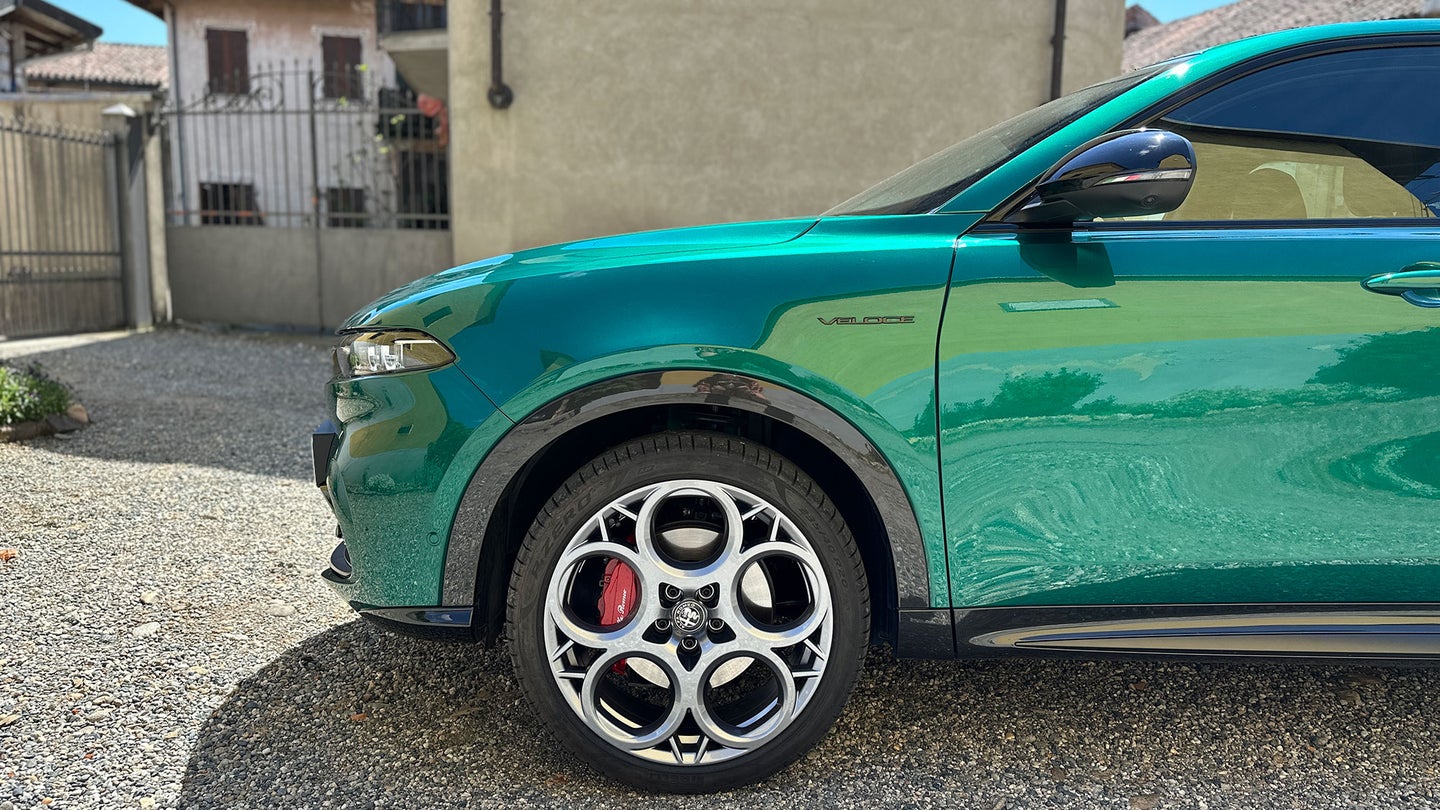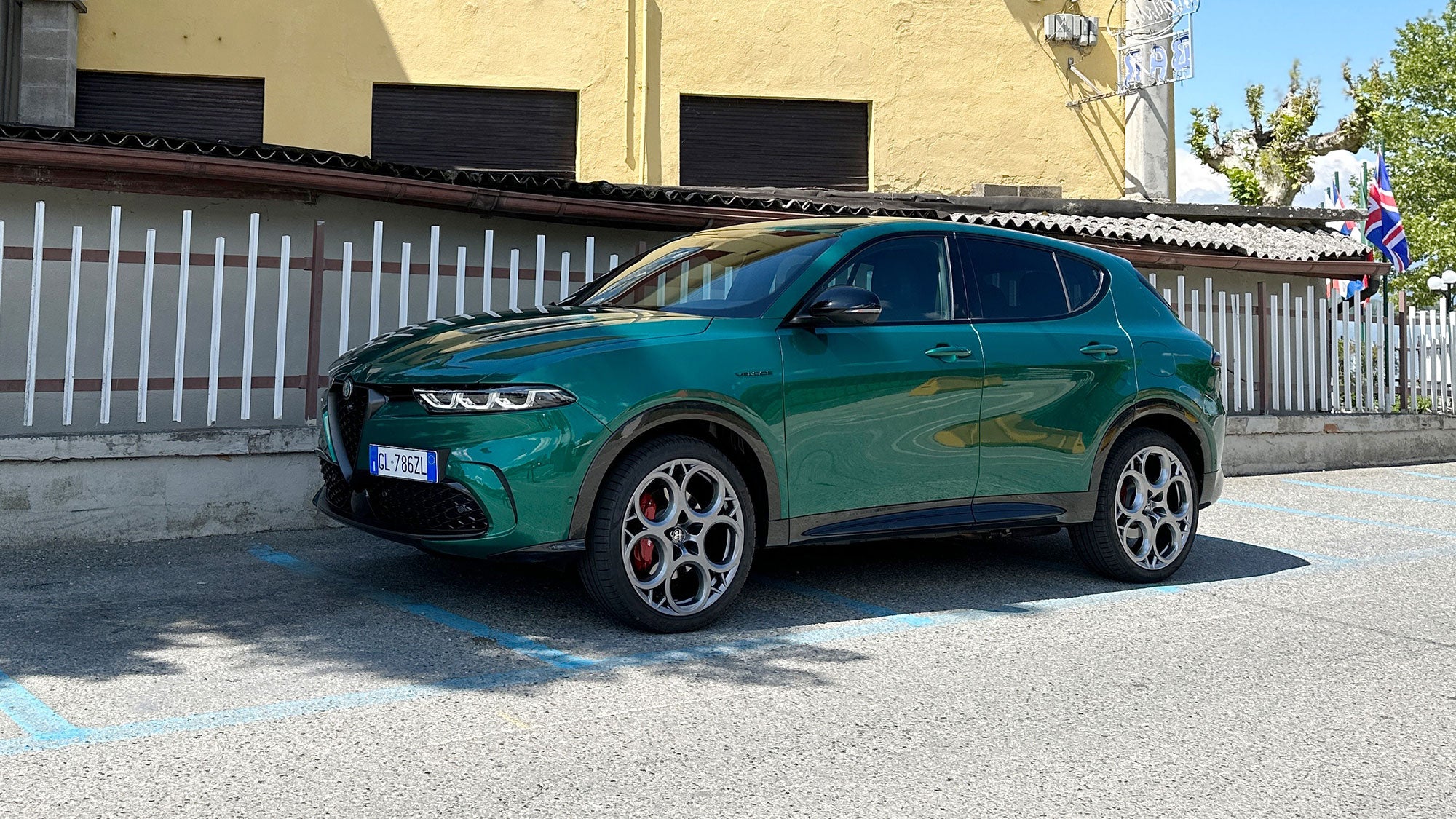There’s something magical about driving Alfa Romeo’s first hybrid
The Tonale can cruise on battery power alone for 30 miles. Plus, a brake-by-wire system saves weight and boosts its stopping power.

Dressed in a glorious shade of green called Verde Fangio Metallic, the all-new Alfa Romeo Tonale slalomed through the city streets of Milan. After dodging pedestrians and cyclists in a dance that seemed natural to Italians and startling to visitors, we drove it onto country roads leading to Alfa Romeo’s prime proving grounds at the Circuito di Balocco test track. It was time to test out the brand’s first hybrid and its first compact crossover: the Tonale.
Alfa Romeo has a 113-year history of building beautiful, powerful cars with an abundance of style. Can its new hybrid pass the test with both established and new fans of the brand? We drove one in Alfa Romeo’s homeland to find out.
The two-tone Tonale: one engine, one motor
The brand’s first all-new vehicle in five years, the Tonale is a follow-up to the popular Stelvio SUV. Situated squarely in the popular compact SUV class, the Tonale competes with gas-powered luxury models like the BMW X1 and Mercedes-Benz GLA as well as the Volvo XC40 plug-in hybrid.
Equipped with a 1.3-liter gas engine up front and a 90-kilowatt electric motor at the rear, the Tonale boasts 285 horsepower and 347 pound-feet of torque. Whether driving on twisty roads or straightaways, I found the Tonale has plenty of vigor, and the responsive steering made for a great drive. The crossover also has a generous sprinkling of Italian charm, which sets it apart from others in the category.
Drive mode selections include Alfa Romeo’s traditional D, N, and A options, which stands for Dynamic, Natural, and Advanced. Each has its own distinctive personality. Spin the dial to Dynamic for access to the full suite of power and to the highest level of brake regeneration, which sends juice to the battery. Natural is the middle-of-the-road option for daily driving, and Advanced offers a more fuel-efficient choice by running the Tonale in battery-only mode for about 30 miles.
The driver can drill down even further for more options to customize the ride. Choosing Comfort is the default suspension partner to Natural and Advanced mode, providing a softer feel. Sport mode (the preset calibration for Dynamic mode) stiffens the ride, meaning better control when you want more of a track-like experience. Alfa Romeo calls it a “dual stage valve electronic suspension” and says it’s intended to offer the driver a choice between performance and comfort.
On the track, I put it through its paces myself, and also slid into the passenger seat with a professional driver behind the wheel. That’s an unusual twist; most crossovers are marketed for staid comfort, not necessarily adventurous, quick turns and acceleration.

Maximizing energy from the Tonale’s battery
Driving the Tonale, I noticed that it was regenerating the battery quickly as I coasted downhill from the mountain passes on the drive route in Dynamic mode. Domenico Bagnasco, head of high-performance vehicles for Alfa Romeo, told me that the vehicle never depletes the battery completely. When the battery starts to run low, the Tonale automatically defaults to Natural mode to recharge it. If you start in Advanced to experience the all-electric range, it will switch over silently and seamlessly. Also, a touch of the e-Save button under the gear shifter helps preserve the battery’s energy by prioritizing the gas engine.
Bagnasco has a history in performance and engineering for both Fiat and Alfa Romeo, serving as the Abarth racing model chief engineer and product development manager for Europe, the Middle East, and Asia. That means he had a hand in the delightful Fiat 124 Spider Abarth, a Miata look-alike with a spunky ride. With the Tonale, he’s putting that experience to use and expanding upon what he’s learned from previous iterations of a long list of Italian models.
He also shared the details of the Tonale’s brake-by-wire system, which means stepping on the brake pedal triggers an electronic signal that activates a microprocessor. Brake-by-wire systems utilize electronic sensors and actuators instead of the mechanical and hydraulic components of traditional braking setups. As a result, braking is designed to be smoother and more predictable instead of predicated solely on the uneven pressure of your foot. For the Tonale, brake action also helps recapture energy.
Brake-by-wire systems are fairly standard fare, especially on hybrid vehicles like the Audi e-Tron and Porsche Taycan. This technology takes stopping power to the next level, compiling input from your surroundings and anticipating braking needs. For instance, if the car senses that you’re headed for a collision based on your speed and that of the car in front of you, the brake-by-wire system can apply maximum braking power for you. And it’s lighter: Dominique says the electronic brake saves 10 pounds overall.

The serpent is a plug
The crossover also includes a generous suite of driver-assist features, including adaptive cruise control, blind-spot monitoring, lane departure assist, and more. It’s also equipped with over-the-air software update capacity, Amazon Alexa, and wireless Apple CarPlay and Android Auto. All of that gilds the performance aspects of this new plug-in hybrid. Even the storied Alfa Romeo logo tells the tale in a version that’s etched onto the driver’s side rear window; the head of the biscione serpent has been stylized into a plug.
Starting at $44,590 (including destination charges) and ranging up to nearly $60,000 with all the options on the top-level Veloce trim, the Tonale is available in dealerships now.
The Tonale, up against its competitors, feels like the difference between a pony ride at a county fair and a pedigreed mare at a steeplechase. Sure, the Tonale could be just another compact crossover on the market. But it’s an Alfa Romeo, and there is something magical about it.
